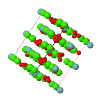issue contents
August 2014 issue

Cover illustration: Schematic illustration of the embedding in superspace for four different classes of aperiodic crystals: displacive and occupational modulation, incommensurate composite, and quasicrystal. For details see Janssen & Janner [(2014), Acta Cryst. B70, 617-651].
research perspectives
Free 

Aperiodic crystals may conveniently be described in a higher dimensional `superspace'. An overview of the method and applications to various families is given.
research papers
Download citation


Download citation


The incommensurately modulated crystal structure and the intermolecular interactions of the organic salt C10H18N+·C7H4FO2− are studied by analysing single-crystal X-ray diffraction data within the (3+1)-dimensional superspace approach and superspace group P21/n(α0γ)00.
B-IncStrDB reference: 9672EtfncG
CCDC reference: 995840
Download citation


Download citation


The use of Mo Kα radiation for the absolute structure determination of crystals made up of enantiopure light-atom molecules was explored. The combination of the methodologies described by Parsons and Hooft and the use of high-resolution reflections was found to be effective to achieve accurate values of the absolute structure parameters.
CCDC reference: 1009312
Download citation


Download citation


The La2Mo2O9 (LM) and Pr2Mo2O9 (PM) single crystals are studied using precision X-ray diffraction and high-resolution transmission microscopy at room temperature.
Download citation


Download citation


A series of temperature-dependent single-crystal and powder diffraction experiments has been carried out using synchrotron radiation for the monogermanides of Mn, Fe and their solid solutions. The thermal expansion coefficient reaches its maximum for metastable MnGe, but no structural phase transition has been observed for any concentration of Mn1−xFexGe in the temperature range 80–500 K.
Download citation


Download citation


The nature and energetics associated with the crystal packing of organic solids and its comparison between polymorphs consisting of charged species (cation and anion pairs) were addressed in detail utilizing crystallographic and computational approaches.
The deficiencies present in the bond-valence theory in explaining mean bond-length variations observed in crystal structures can be overcome by taking into account the contribution of bond topology and bond strain to a constant bond-length value.
Download citation


Download citation


3-(4-Pyridyl)-acetylacetone (HacacPy) may be used as an N donor ligand in coordination chemistry and in thermal degradation, and its metal complex Fe(acacPy)3 can act as a poly(pyridine) bridge between two or three cations.
Download citation


Download citation


Salt hydrates of different water content and different crystal structures (Na2SO4·7H2O, tetragonal, space group P41212 and Na2SeO4·7.5H2O, monoclinic, space group C2/c) can act mutually as a crystal nucleus, so that either of these salts can initiate crystallization of the other from their supersaturated solutions (a kind of heteroepitaxy). This phenomenon is attributed to similarities between particular elements of their structures.
Download citation


Download citation


The charge-density distribution in sodium bis(4-nitrophenyl)phosphate has been studied experimentally and by density-functional theory calculations.
CCDC reference: 1001668
Download citation


Download citation


The crystal structure of the decagonal phase in the system Al–Ni–Rh (d-Al–Ni–Rh) was analyzed in the five-dimensional embedding approach based on single-crystal synchrotron X-ray diffraction data. The structure can be described as a quasiperiodic packing of partially overlapping decagonal and pentagonal columnar clusters with ∼ 21 Å diameter and ∼ 4 Å period along the tenfold axis.
Download citation


Download citation


CBN crystals are polymorphic with an orthorhombic one-dimensionally and a tetragonal two-dimensionally modulated superstructure.
B-IncStrDB reference: 9692EcLKMW
Download citation


Download citation


Seven new molecular salts of norfloxacin were synthesized and structurally elucidated by single-crystal structure analysis. Physical and chemical properties were evaluated by a variety of analytical techniques.
Download citation


Download citation


Donor-stabilized addition complexes of nickel(II) with disubstituted diphenyldithiophosphates have been successfully isolated and characterized by various physico-chemical techniques and single-crystal X-ray analysis.
Download citation


Download citation


Calcinaksite is considered as a potential component of cements and concretes and a potential matrix for the immobilization of small molecules (in its channel system) and ions (on its cationic sites).
CCDC reference: 1006765
letters to the editor
Free 

The sixth blind test of organic crystal-structure prediction methods is announced along with details of the format and how to participate.
book reviews
Free 

Free 



 journal menu
journal menu



































